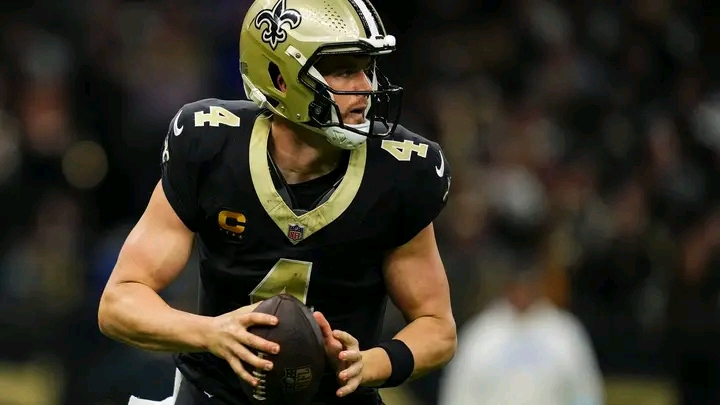Below is an extensive article discussing the developments surrounding New Orleans Saints quarterback Derek Carr’s shoulder injury, the potential impact on the team’s season, and the broader ripple effects across the NFL. This article weaves together insights from multiple recent reports and analyses to offer a comprehensive look at the situation.
Derek Carr’s Shoulder Injury: A Turning Point for the Saints and the NFL
The New Orleans Saints’ quarterback situation has taken an unexpected twist. Veteran signal-caller Derek Carr, who has been entrusted with leading the franchise in recent seasons, is now reportedly dealing with a significant shoulder injury. According to multiple sources, the injury is severe enough that Carr could potentially miss the entire 2025 NFL season if he opts for surgery. This development is already reverberating throughout NFL circles—not only putting the Saints’ season in jeopardy but also altering draft and free agency calculations across the league.
A Background on Derek Carr’s Tenure with the Saints
Derek Carr, a seasoned quarterback with over a decade of NFL experience, made the move to New Orleans after a long tenure with the Las Vegas Raiders. Since joining the Saints, Carr was viewed as the long-term answer at quarterback, having signed a four-year, $150 million deal that was restructured during the offseason to better align with the team’s future plans. Carr’s statistics, accumulated over two seasons with New Orleans, include a cumulative record that shows flashes of brilliance interspersed with injury concerns; he has amassed notable passing yardage and earned multiple Pro Bowl nods over the years. Yet, his recent injury troubles—recorded as oblique and hand issues during his limited 2024 campaign—had already cast a shadow over his durability. Now, with a fresh report emerging on a shoulder injury that may require surgery, that shadow looms larger than ever before.
The Nature of the Injury and Its Immediate Implications
Reports from NFL Network Insider Ian Rapoport and other reputable sports media have suggested that Carr’s shoulder injury is more significant than a mere bruise or sprain. With details remaining somewhat guarded, it is clear that the injury affects his throwing arm—a critical component for any quarterback’s arsenal. Carr’s shoulder problem not only puts his personal season in serious jeopardy but also raises questions about his long-term health and his ability to continue performing at an elite level.
Carr’s injury comes on the heels of a 2024 season in which he played only 10 games, recording 2,145 passing yards, 15 touchdowns, and five interceptions. Those ten games were punctuated by his prior absence due to injuries, while the team struggled to find stability at the quarterback position with backup Spencer Rattler and Jake Haener splitting responsibilities during his absences. This fragmented approach led the Saints to finish with subpar performances on the field, with losses piling up in games where Carr was sidelined. The prospect of his shoulder injury sidelining him for all of 2025 raises uncomfortable scenarios for a franchise that had pegged him as the mainstay around which their offense was built ().
Tactical and Strategic Repercussions for the Saints
Quarterback Room Uncertainty
With Carr’s potential prolonged absence, the Saints are suddenly thrust into a predicament that leaves them with little time to recast their offensive plans. The team currently has a cadre of quarterbacks on the roster, including Spencer Rattler, Jake Haener, and Ben DiNucci. While each has had their moments and opportunities to step up, none have yet proven to be the reliable long-term solution that Carr was expected to be. Rattler, in particular, had shown some promise by starting six games last season, but his overall performance has been inconsistent at best. The Saints’ inability to secure a win in games where Carr was unavailable (finishing 0–7 in those outings) accentuates the chasm between aspirations and current talent at the position ().
The Draft and Future of New Orleans’ QB Situation
Another layer to the unfolding drama is the impending 2025 NFL Draft. New Orleans holds the No. 9 overall pick—a position that has taken on newfound importance in light of Carr’s injury. With their established veteran leader potentially out for the season, the Saints now face a critical decision: should they invest a high draft pick in a potential quarterback, or try to weather another season with their current backups?
Several prominent quarterback prospects, including former Colorado standout Shedeur Sanders and Ole Miss’s Jaxson Dart, have been mentioned as potential targets for the franchise. Analysts now speculate that if Carr’s injury forces the Saints to miss a season, then drafting a young quarterback—even if not an immediate starter—could provide a long-term solution at a relatively affordable price. The strategic calculus of trading draft capital or even possibly courting an experienced free agent (such as Aaron Rodgers, who is also mentioned in trade talks) now becomes significantly more complex. There is a real possibility that the Saints might decide to draft a quarterback to fill the void or to provide competition while planning for the future (, ).
Ripple Effects Across the NFL
Impact on the Draft Landscape
Carr’s injury does not occur in a vacuum. The disruption it causes in New Orleans is already influencing how other NFL teams are positioning themselves in the upcoming draft. For instance, if the Saints decide to draft a quarterback with their No. 9 pick, it could potentially shift other teams’ needs and strategies. In one analysis, it was noted that teams like the San Francisco 49ers are monitoring these developments closely. The 49ers, already engaged in quarterback discussions and looking to secure talent on both sides of the ball, might benefit indirectly if the Saints use their pick on a quarterback. This, in turn, could provide the 49ers with opportunities to target other positions in later rounds ().
Additionally, teams like the Los Angeles Chargers are watching these developments with interest. With draft-day trades and pick-shuffling becoming a regular part of NFL strategy, any shift in the Saints’ plans due to Carr’s injury might open up valuable prospects elsewhere. One report from Sports Illustrated even suggested that the Chargers might derive indirect benefit from the shift in draft priorities among NFC teams ().
Free Agency and Trade Rumors
Carr’s injury has also rekindled discussions about free agency at the quarterback position. With veteran quarterbacks such as Aaron Rodgers and Carson Wentz reportedly available, the Saints could potentially explore a mid-season signing if they choose not to draft a quarterback immediately. However, the prospects of landing a free-agent quarterback who can immediately replicate Carr’s production is far from guaranteed. Rodgers, for instance, has been the subject of intense trade speculation, with the Pittsburgh Steelers emerging as a frontrunner for his services. Should Rodgers decide that New Orleans offers too steep a challenge or if his interests lie elsewhere, the quarterback void could persist for the Saints ().
Implications for Team Chemistry and Fan Sentiment
A quarterback is not just an on-field position; he is the centerpiece around which the team builds its strategy, locker room culture, and fan identity. Derek Carr’s injury therefore has ramifications far beyond mere statistics. The Saints’ supporters—long accustomed to the prospect of witnessing a franchise quarterback at work—now face uncertainty. On social media and fan forums, there is a mixture of disappointment, concern, and even cautious optimism. While some fans yearn for the stability Carr once brought to the team, others see this as an opportunity to usher in a new era through draft selections or alternative free agency moves ().
For the coaching staff and front office, the challenge is twofold. Not only must they prepare the team for the possibility of a season without their star, but they must also ensure that the roster’s depth at quarterback is adequate to compete in one of the NFL’s most unpredictable divisions. The new head coach, Kellen Moore, faces intense scrutiny as he navigates a situation compounded by injuries, previous roster moves, and external pressures from fans and the media alike.
Historical Precedents and Lessons Learned
Looking back through NFL history, injuries to star quarterbacks have often altered the course of a franchise. Consider examples like the Los Angeles Rams when quarterback injuries in previous seasons forced them to retool their roster during the draft. In many cases, teams that successfully navigated these crises were those who had built depth through shrewd draft picks and free-agent acquisitions. However, such transitions are rarely smooth. The Saints now stand at a crossroads where their future success in 2025 could be determined by decisions made in the coming weeks and months.
Veteran quarterbacks have faced similar setbacks before—be it through torn ACLs, broken bones, or long-term shoulder issues. The common thread in such stories is that the injury creates an urgent need for contingency plans. For the Saints, the current situation has become a catalyst for a broader strategic overhaul. The team’s management and coaching staff must reconcile the current setback with a vision that balances short-term competitiveness with long-term sustainability.
Broader NFL Implications: Shifting Power Dynamics
Carr’s injury also fits into a larger narrative that has been developing across the NFL. As teams look for ways to remain competitive in an increasingly unpredictable league, the reliance on veteran quarterbacks who bear the scars (both literal and figurative) of years in the league is being reexamined. The trend towards drafting young, high-upside quarterbacks is not solely a product of salary cap concerns but also a strategic shift aimed at securing long-term stability. In this light, the Saints’ predicament is emblematic of a league in transition. Organizations that fail to adapt to the evolving dynamics of quarterback play risk lagging behind their more forward-thinking counterparts.
For players, Carr’s situation reinforces the perilous nature of a career in professional football. Even established stars are not immune to injuries that can derail an entire season or even a career. The conversation now encompasses not just recovery protocols but also long-term health planning—a topic that has become ever more important in NFL circles as player longevity is scrutinized like never before.
The Road Ahead for the Saints
What options do the Saints have moving forward? Broadly, they fall into one of several distinct paths:
- Surgical Intervention and Rehabilitation:
If Carr elects to undergo surgery, the timeline for recovery becomes the critical question. Modern orthopedic techniques offer hope, but the uncertainty of recovery time may still force the team to rely on backups throughout the 2025 season. - Drafting a New Quarterback:
Using their No. 9 draft pick to bring in a young quarterback could set the stage for a rebuild or a transition period. Prospects like Shedeur Sanders or Jaxson Dart represent intriguing possibilities. Drafting a high-upside quarterback would not only address the immediate need but could also serve as a foundation for future success. - Free-Agent or Trade Market Moves:
The Saints might explore the free-agent market, targeting veteran quarterbacks who can provide an immediate boost. However, given the competitive landscape and the high stakes involved, this option carries its own set of risks and uncertainties. - Internal Development:
Alternatively, the Saints may decide to place their faith in the developing talents of Spencer Rattler, Jake Haener, or even Ben DiNucci. This path carries the risk of further instability but could also offer a sense of continuity and internal growth.
Each of these options involves complex trade-offs. The decision will weigh heavily on the executive suite, the coaching staff, and—inevitably—the expectations of a fan base desperate for stability and success

